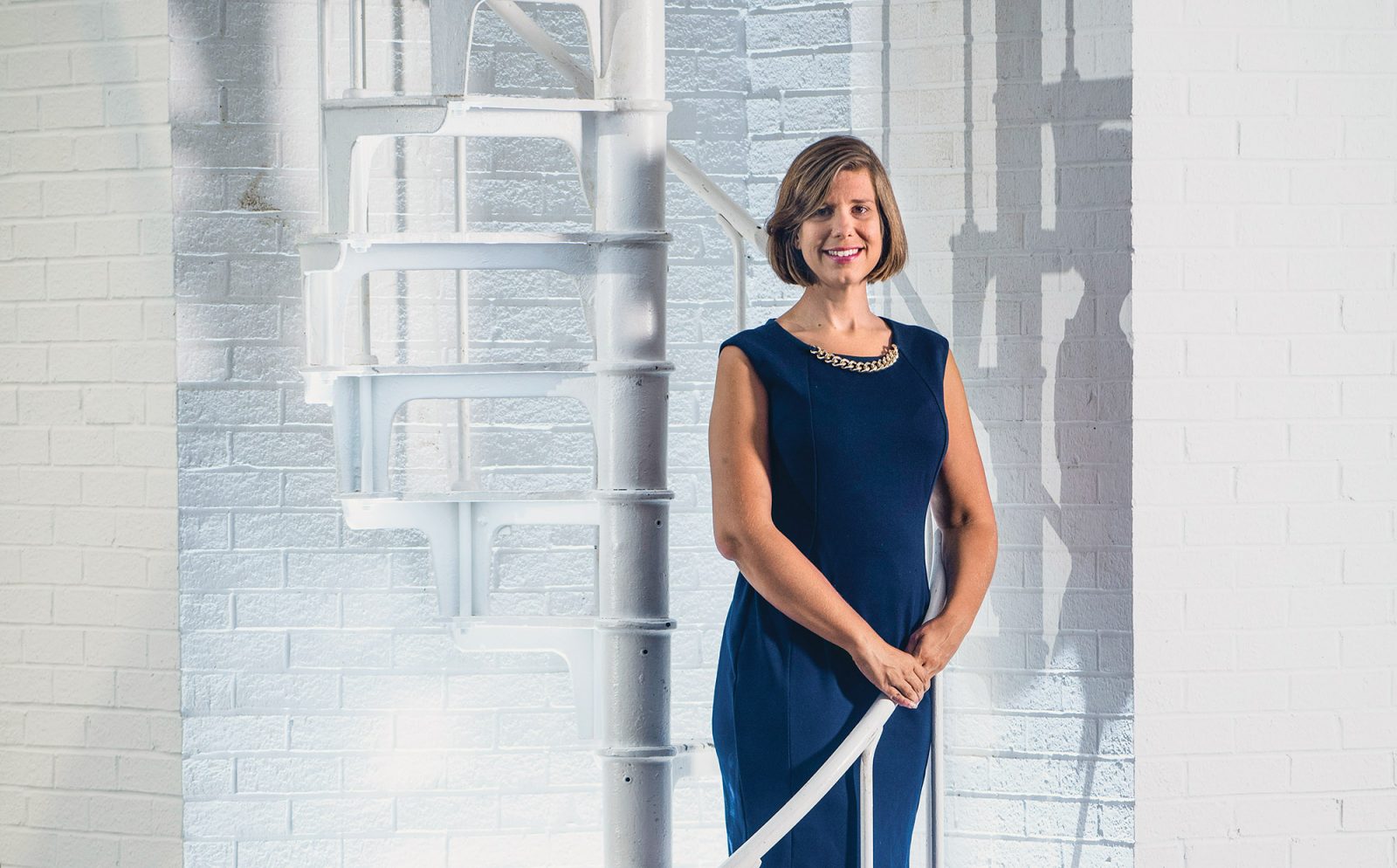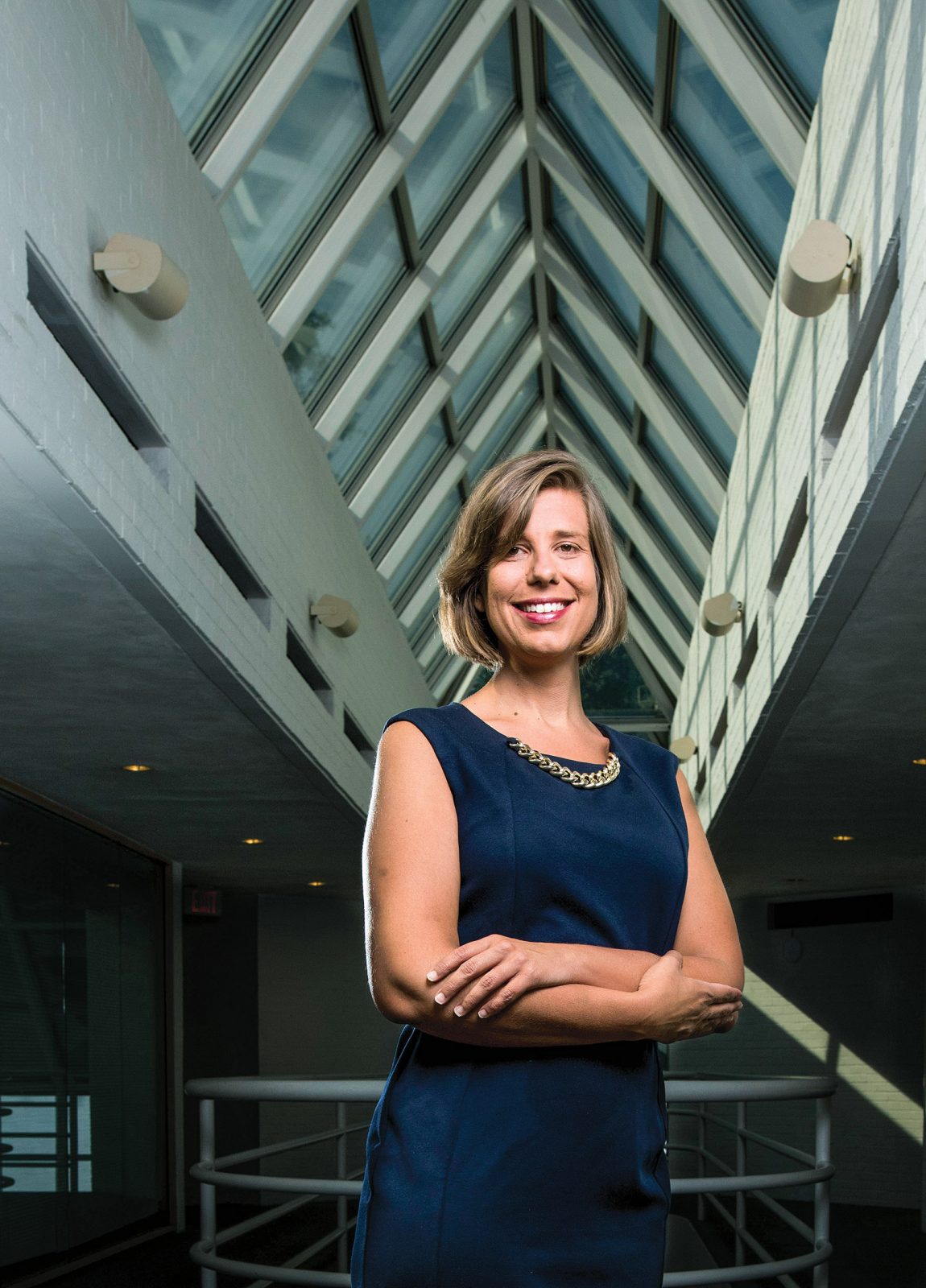What Gets Remembered
Posted on Sept. 14, 2017
“I love getting those dream requests,” says Brooke Andrade ’02, head librarian at the National Humanities Center. “We have a 99 percent success rate in finding what they want.” (Photo by Grant Halverson ’93)
Type “Frederick Douglass” into Google, and you get several million results.
The internet turns up a seemingly endless trove of books, encyclopedia entries and academic articles about the famous 19th-century abolitionist. You can read his speeches, watch documentaries about his life and find dozens of schools named after him. And all that within the first few pages of online results.
It feels comprehensive and overwhelming — more than you could ever want or need.
But there’s plenty missing in those millions of links. What you can’t get from a Google search — and what you couldn’t find from LexisNexis, ProQuest or any other searchable database — are hundreds of letters and news articles written about Douglass’ family. That priceless material rests beyond the reach of the digital world, tucked away in drawers of microfilm and shelves of yellowing newsprint.
To find those — to uncover a more complete story about one of the nation’s best-known historical figures — you need Brooke Andrade ’02, who also earned her master’s in library science from UNC in 2004. She directs the library at the National Humanities Center in Research Triangle Park.
“Without Brooke, I couldn’t have written and researched the book,” said Celeste-Marie Bernier, a professor at the University of Edinburgh who spent a year at the humanities center compiling a new history of Frederick Douglass. “It would have meant Douglass’ family remained invisible — that we simply wouldn’t have known about their work and their role.”
“She’s a rock-star goddess,” says one satisfied researcher. “I came with a shopping list of the impossible, and she found everything.
Bernier began her project expecting there might be as many as 350 relevant letters and articles scattered in archives across the U.S. By the end of the year, Andrade had turned up more than 800.
“She’s a rock-star goddess,” Bernier said. “I came with a shopping list of the impossible, and she found everything. In my 20 years working with archives, libraries and specialist librarians, it was the best experience I ever had.”
Andrade gets that kind of praise a lot. She spends her days tending to the obscure needs and eclectic interests of the humanities center’s 40 faculty fellows. That can involve hunting down manuscripts, paying for high-resolution photos of artwork or ancient maps, and cajoling South American booksellers to search their shelves for strange titles.
“It’s fun every single day,” Andrade said. “And it’s really fun to have a group of people who appreciate your work so much.”
The humanities center fellows come from all over the world to spend an academic year reading, writing and researching in the center’s monastic headquarters, a white-brick oasis shielded from distraction and regular faculty duties. Winning one of the highly competitive fellowships means a stipend, a tidy office with a lovely view of North Carolina pine forest and an on-site chef to prepare daily made-from-scratch lunches.
And for all of that, the library service remains a top draw. Each year, the fellows make in the neighborhood of 10,000 unique queries of Andrade and her small staff, covering everything from Japanese archeology records to Vatican artworks.
The vast majority can be fulfilled through partnerships with the libraries at UNC, Duke and N.C. State. “One of the reasons the center is here in North Carolina is the proximity to the three research universities and their libraries,” said Don Solomon ’86, the center’s director of communications. “People are always astonished to hear this, but there are more books here in the Triangle than almost anywhere else in the country.”
For requests that can’t be handled with a simple library loan, Andrade and her staff break out their detective skills. They ask incoming fellows to bring their toughest cases, so scholars often arrive with an obscure wish list of citations they’ve never been able to track down.
“I love getting those dream requests,” Andrade said. “We have a 99 percent success rate in finding what they want.”
Andrade became a librarian after briefly considering life as an academic. As an undergraduate English major at UNC, she found that spending time in Davis Library brought a profound sense of connection to other ages, other minds. She enjoyed the deep dive of research more than the writing it was supposed to serve.

“It’s fun every single day,” Andrade said. “And it’s really fun to have a group of people who appreciate your work so much.” (Photo by Grant Halverson ’93)
“It’s fun every single day,” Andrade said. “And it’s really fun to have a group of people who appreciate your work so much.”
“I like books as physical objects, and I always have,” she said. “I still have my ninth-grade copy of Romeo and Juliet, where I wrote insightful marginalia like, ‘This is so stupid!’ ”
After finishing her master’s in library science, she took a job as a reference and instruction librarian at Adams State University, a small public institution in Alamosa, Colo. It was satisfying work, supporting faculty and students at a rural and Hispanic-serving school, and Andrade carved out a niche as the library liaison for the humanities.
She had been there for six years when a graduate school friend told her about an opening at the humanities center. It was too good to pass up. “The time and the resources we have here are just phenomenal,” she said. “This position really trained me in how to locate information that is off the grid.”
One of the scholars who took her up on the challenge last year was Florence Dore, associate professor in UNC’s department of English and comparative literature. For her upcoming book on rock ’n’ roll influences in American literature, Dore was looking for evidence of a surprising appearance at the 1934 meeting of the Modern Language Association in Philadelphia.
There were sketchy accounts of a visit by Huddie Ledbetter, better known as Lead Belly, the renowned African-American bluesman from Louisiana. The rumor of Lead Belly — a virtuoso guitarist who recently had been released from prison — joining a buttoned-up academic conference was tantalizing for Dore and would be a great story for her book. But she couldn’t find solid confirmation of the event.
“I handed the search over to Brooke, and she owned it,” Dore recalled. “She’s so interested and so alive to the research.”
It took months of detective work, but Andrade tracked down a newspaper clipping buried in an archival box at the University of Texas. “Two Time Dixie Murderer Sings Way to Freedom,” read the headline in the Philadelphia Independent, a long-defunct black newspaper. It detailed how Lead Belly came to accompany John Lomax, an English professor with an interest in folk songs, to the conference.
If not for the single clipping held at UT-Austin, almost no trace of that early link between the academic world and the African-American blues tradition would survive.
“Lots of archival material from black newspapers has been destroyed,” Dore noted. “So the whole process of trying to find this turned up interesting facts about cultural history.”
Andrade spends a lot of time thinking about what gets remembered and what gets lost. History is never impartial, and she sees a librarian’s job as helping to unearth a more complete, more honest story.
Her time at the National Humanities Center also has given her a deep reverence for the value of scholarly work, however impractical or narrow it might seem today.
“You can’t measure the value of a book by how many times it’s been checked out or how many libraries own it. We’ll sometimes get books out of deep storage at Davis Library, and it’s 100 years old, and the pages are still uncut. Then our scholar reads it and says, ‘Wow, this is one the most amazing things I’ve ever seen!’
“One book could be checked out one time and change a discipline forever.”
A librarian’s dream. And a humbling reminder that knowledge holds enduring power, even if you can’t Google it.
–Eric Johnson ’08
Thanks for reading the Carolina Alumni Review
Carolina Alumni members, sign in to continue reading.
Not yet a member? Become one today.
